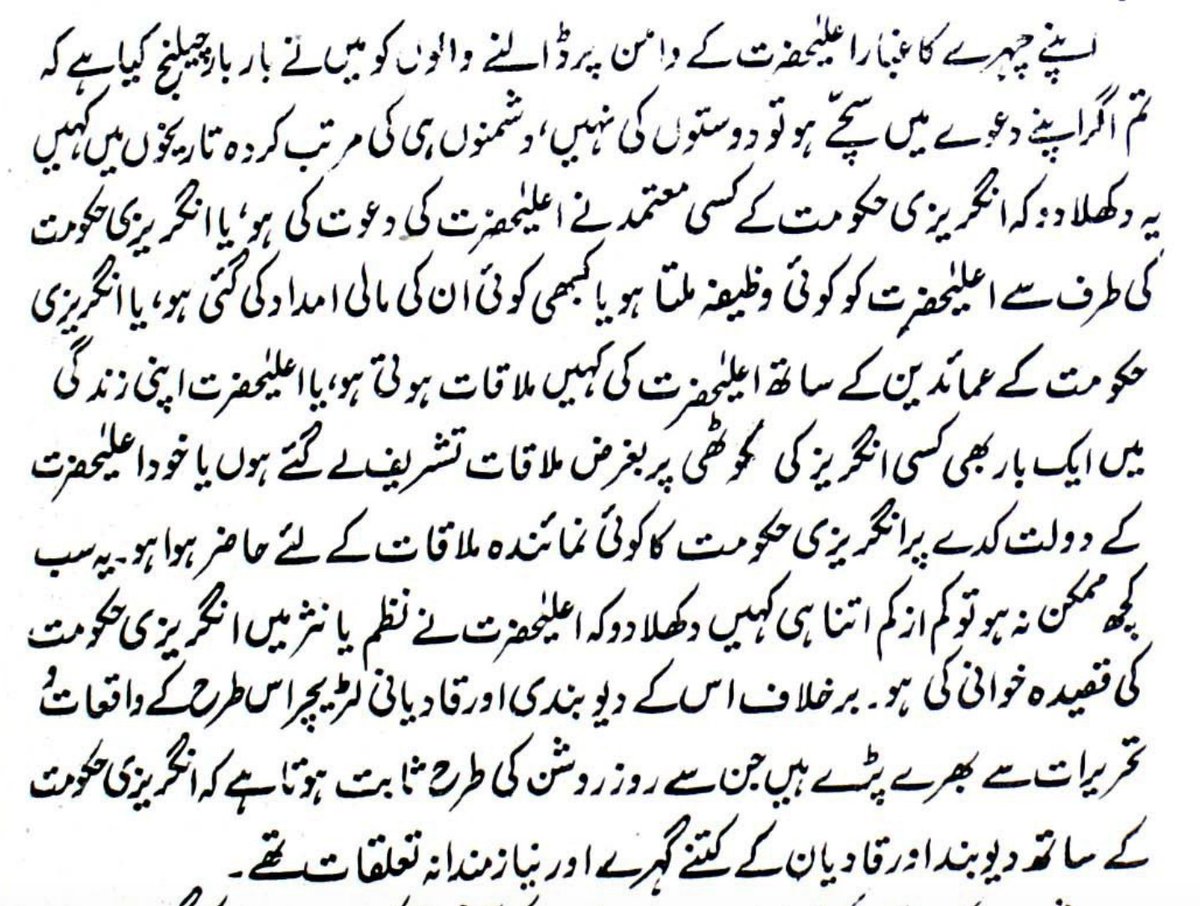
ORIGIN OF WAHĀBISM?
Alahazrat Imām Aĥmad Riđā Khān al-Ĥanafī al-Baraylawī [1272-1340 AH / 1856-1921 CE] received a query from Madrasah e Ahl e Sunnat, Bāzār Dīwān, Murādābād, sent by Maulavi Abu’l Masúūd Ábdu’l Wadūd Sahib, Ţālib e Ílm [student of knowledge], on 1st Jamād al-Ūlā

Alahazrat Imām Aĥmad Riđā Khān al-Ĥanafī al-Baraylawī [1272-1340 AH / 1856-1921 CE] received a query from Madrasah e Ahl e Sunnat, Bāzār Dīwān, Murādābād, sent by Maulavi Abu’l Masúūd Ábdu’l Wadūd Sahib, Ţālib e Ílm [student of knowledge], on 1st Jamād al-Ūlā


1336 AH:
Which sect is Wahābī, which are common, and where is their origin from, and what are their beliefs, and what has come in the Ĥadīth in their matter?
The answer:
Wahābī is a faithless sect, which burns at the honouring of those beloved to Allāh and wishes to erase
Which sect is Wahābī, which are common, and where is their origin from, and what are their beliefs, and what has come in the Ĥadīth in their matter?
The answer:
Wahābī is a faithless sect, which burns at the honouring of those beloved to Allāh and wishes to erase
their remembrance and honouring by various sorts of stratagems. Its origin is from Iblīs Laýīn [accursed], that Allāh ázza wa jall gave the command to honour Sayyidunā Ādam عليہ الصلاة والسلام and that Malúūn did not accept. And in the time of Islām Dhu’l Khuwayşarah Tamīmī
became its leader, who uttered words of blasphemy in the high status of Ĥuzūr e Aqdas ﷺ. After him, an entire group treaded upon that path, the Khawārij, whom Amīru’l Mu’minīn Mawlā Álī fought. People said, “Praise be to Allāh who cleansed the earth from their impurities”,
Amīru’l Mu’minīn stated, “They have not come to an end, currently they are in the wombs of their mothers and the loins of their fathers, when one congregation of theirs is eradicated, another will rear its head, until its final group shall emerge with Dajjāl.”
According to this Ĥadīth, these people kept appearing in each age with new names, until in the latter part of the twelfth century Ibn Ábdu’l Wahhāb Najdī became the chief of this sect, and he wrote Kitābu’t Tawhīd, and in the guise of Tawĥīd of Allāh ázza wa jall, he freely
disrespected the Anbiyā’a and Awliāa’a علیہم الصلاة والسلام, and Ĥuzūr e Aqdas Sayyidu’l Anām افضل الصلاة والسلام himself, the name of this group became Najdī Wahābī in relation to him. Ismāýīl Dihlawī spread this Fitnah e Malúūnah in Hindustan; he translated Kitābu’t Tawhīd,
his true belief is that which he wrote in many places in clear words in Taqwiyatu’l Īmān, that “Do not believe in anyone other than Allāh, to believe in others is mere insanity.” The group that are his followers, they are all one in beliefs, but became divided in terms of actions
as such: One group also abandoned Taqlīd and themselves became Ahl e Ĥadith, these are the Ghayr Muqallid Wahābīs, their leader is Nazīr Ĥusayn Dihlawī and some Punjabis and Bengalis were and are. And the leaders of the Muqallid Wahābīs are Rashīd Aĥmad Gangohī and
Qāsim Nānotwī, and now Ashraf Álī Thānawī. Whoever considers these people to be good, or believes in Taqwiyatu’l Īmān etc, their books, or doubts in their being misguided and heretic, he is a Wahābī. The sign of the Wahābī has been mentioned in the Ĥadīth, that externally they
shall be very observant of the Sharīát, “You shall consider your prayer compared to their prayer, and you shall consider your fasting compared to their fasting, and your deeds compared to their deeds to be insignificant. They shall recite the Qur’ān, but it shall not descend
beyond their throats,” meaning there will be no affect of it in the heart, “they will say what apparently seems very good”, and in one narration is, “they will quote the Ĥadīth much”, this shall be their condition: “they shall exit the Dīn as the arrow exits the target, then they
shall not return back to the Dīn, their sign shall be shaving the head, their loincloths or trousers shall be very high.” The explanation of their beliefs is in my monograph Nūru’l Furqān and [my] monograph al-Kawkabatu’sh Shihābiyyah. And Allāh táālā knows best.
[Fatāwā al-Riđawiyyah]
• • •
Missing some Tweet in this thread? You can try to
force a refresh





















